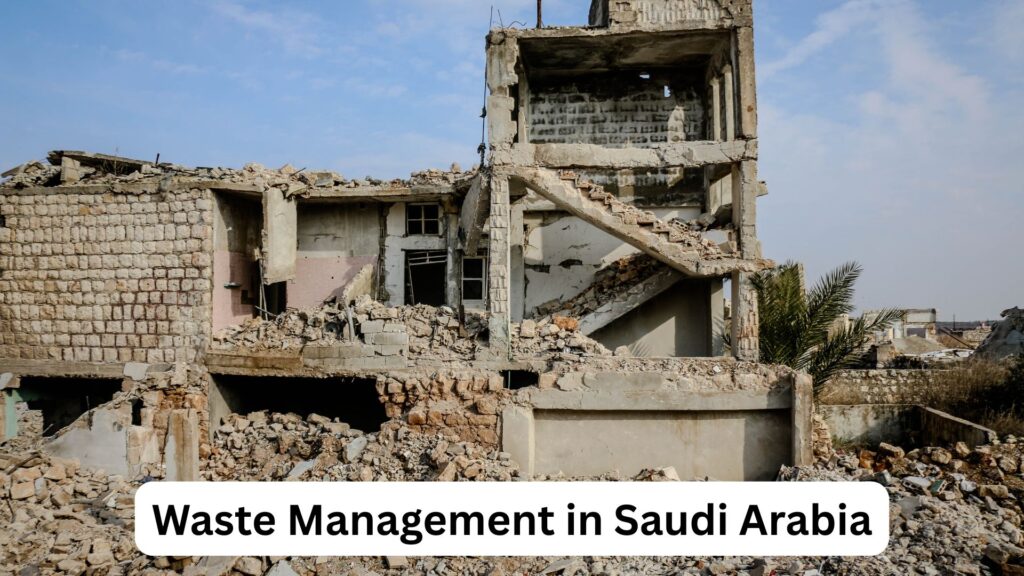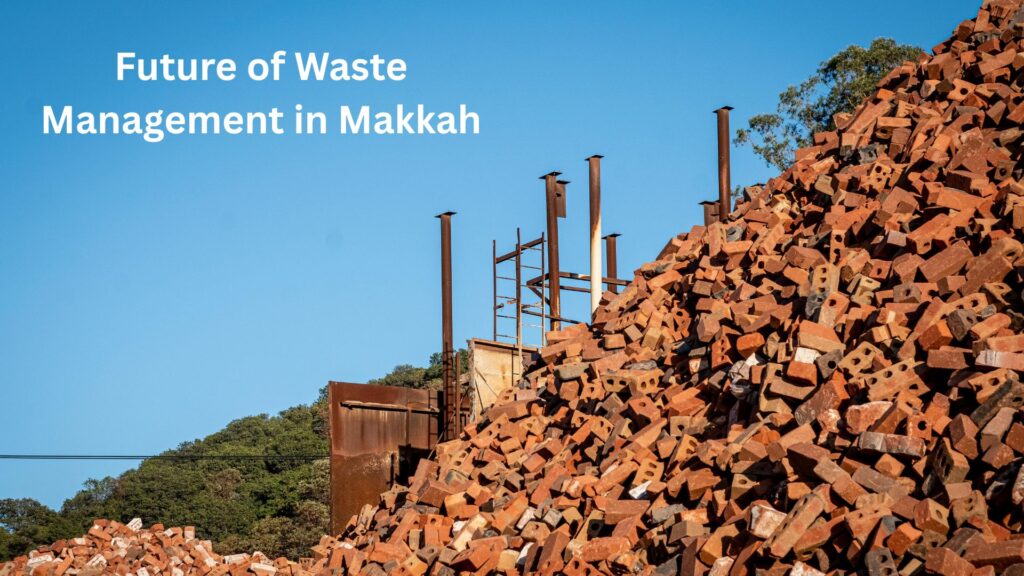Introduction
Makkah, the holiest city in Islam, is not only a spiritual hub but also a rapidly developing urban center. With large-scale construction projects like the Haram expansion, the city generates significant amounts of construction waste. Effective construction waste materials management in Makkah is crucial to maintaining the city’s environmental sustainability and supporting its growth. This article explores the intricacies of construction waste materials management in Makkah, waste management practices in Saudi Arabia, the four types of waste management, Saudi Arabia’s waste management laws, Saudi Aramco’s waste management plan, and more.
Introduction to Construction Waste Management in Makkah
Makkah’s rapid urbanization, driven by its religious significance and increasing population, has led to a surge in construction activities. These projects generate substantial amounts of waste, including concrete, wood, metal, and plastic. Proper management of construction waste is essential to minimize environmental impact, reduce landfill dependency, and promote recycling.
Construction waste management in Makkah involves the systematic handling, disposal, and recycling of materials generated during construction, renovation, and demolition activities. The city faces unique challenges due to its high-density urban environment and the need to preserve its cultural and religious heritage. Effective waste management strategies are vital to ensuring sustainable development in Makkah.
Waste Management in Saudi Arabia

Image credits: canva.com
Saudi Arabia has made significant strides in waste management in recent years. The country generates over 15 million tons of solid waste annually, with construction and demolition waste accounting for a substantial portion. The Saudi government has implemented various initiatives to improve waste management, including the National Waste Management Strategy and the Vision 2030 sustainability goals.
Key aspects of waste management in Saudi Arabia include:
- Government Initiatives: The Saudi government has launched several programs to promote recycling, reduce landfill use, and encourage public participation in waste management.
- Private Sector Involvement: Private companies play a crucial role in waste collection, recycling, and disposal, particularly in urban areas like Makkah, Riyadh, and Jeddah.
- Public Awareness Campaigns: The government has initiated campaigns to educate the public about the importance of waste segregation, recycling, and sustainable practices.
4 Types of Waste Management
There are four primary types of waste management, each with its advantages and disadvantages:
- Landfill:
- Description: Waste is disposed of in designated landfill sites.
- Advantages: Cost-effective and straightforward.
- Disadvantages: Environmental pollution, limited space, and long-term sustainability issues.
- Recycling:
- Description: Waste materials are processed and reused to create new products.
- Advantages: Reduces resource consumption, minimizes landfill use, and lowers greenhouse gas emissions.
- Disadvantages: Requires infrastructure, technology, and public participation.
- Incineration:
- Description: Waste is burned at high temperatures to generate energy.
- Advantages: Reduces waste volume and produces energy.
- Disadvantages: Air pollution and high operational costs.
- Composting:
- Description: Organic waste is decomposed to produce compost for agricultural use.
- Advantages: Reduces landfill use and enriches soil.
- Disadvantages: Limited to organic waste and requires proper management.
Waste Management Law in Saudi Arabia
Saudi Arabia has established stringent waste management laws to regulate waste disposal and promote recycling. Key provisions include:
- Regulations for Construction Waste Disposal: Contractors are required to segregate and dispose of construction waste responsibly.
- Recycling Mandates: Certain materials, such as metal and concrete, must be recycled.
- Penalties for Non-Compliance: Fines and penalties are imposed on individuals and companies that violate waste management regulations.
These laws aim to reduce environmental pollution, conserve resources, and promote sustainable development.
Waste Management Plan of Saudi Aramco
Saudi Aramco, the state-owned oil company, has implemented a comprehensive waste management plan to address the environmental impact of its operations. Key components of the plan include:
- Waste Minimization: Reducing waste generation through efficient resource use and process optimization.
- Recycling and Reusing: Recycling materials like metal, plastic, and concrete to minimize landfill use.
- Environmental Sustainability: Aligning waste management practices with Saudi Arabia’s Vision 2030 sustainability goals.
Saudi Aramco’s waste management plan serves as a model for other industries in the region.
Advantages and Disadvantages of Construction Waste Management Methods
- Recycling vs. Landfilling:
- Recycling: Reduces environmental impact but requires investment in infrastructure and technology.
- Landfilling: Cost-effective but contributes to pollution and resource depletion.
- Incineration vs. Composting:
- Incineration: This generates energy but produces air pollution.
- Composting: Environmentally friendly but limited to organic waste.
Comparisons and Similarities
Construction waste management practices in Makkah are similar to those in other major Saudi cities like Riyadh and Jeddah. However, Makkah faces unique challenges due to its high-density urban environment and religious significance. All three cities emphasize recycling and landfill reduction, but Makkah’s waste management strategies are tailored to its specific needs.
Features and Types of Construction Waste
Construction waste can be categorized into several types, each requiring specific management approaches:
- Concrete: Recycled for use in new construction projects.
- Wood: Repurposed or used for energy generation.
- Metal: Highly recyclable and valuable.
- Plastic: Recycled or incinerated for energy recovery.
Challenges and Solutions
Makkah faces several challenges in managing construction waste, including:
- Limited Landfill Space: Solutions include promoting recycling and waste-to-energy technologies.
- High Recycling Costs: Government subsidies and private sector investment can help offset costs.
- Public Awareness: Educational campaigns can encourage responsible waste disposal practices.
Future of Waste Management in Makkah

Image credits: canva.com
The future of construction waste management in Makkah lies in adopting innovative technologies and practices, such as:
- Smart Waste Tracking Systems: Using IoT and AI to monitor waste generation and disposal.
- Circular Economy Practices: Emphasizing resource efficiency and waste reduction.
- Sustainable Construction Methods: Incorporating green building practices to minimize waste generation.
Conclusion
Construction waste materials in Makkah are a critical component of the city’s sustainable development. By adopting effective waste management strategies, promoting recycling, and leveraging innovative technologies, Makkah can address its waste management challenges and set an example for other cities in Saudi Arabia. With the support of government initiatives, private sector involvement, and public participation, Makkah can achieve its waste management goals and contribute to a cleaner, greener future.
FAQs
1. Why is construction waste management important in Makkah?
Construction waste management is crucial in Makkah due to the city’s rapid urbanization and large-scale construction projects, such as the Haram expansion. Proper management helps reduce environmental pollution, conserve resources, and minimize landfill dependency. It also supports sustainable development, ensuring the city remains clean and environmentally friendly for residents and millions of annual pilgrims.
2. What are the four main types of waste management?
The four primary types of waste management are:
- Landfill: Disposing of waste in designated sites.
- Recycling: Processing waste materials to create new products.
- Incineration: Burning waste to generate energy.
- Composting: Decomposing organic waste to produce compost for agricultural use. Each method has its advantages and disadvantages, depending on the type of waste and the environmental goals.
3. What are the key features of Saudi Arabia’s waste management laws?
Saudi Arabia’s waste management laws focus on regulating waste disposal, promoting recycling, and enforcing penalties for non-compliance. Key provisions include:
- Mandatory segregation and responsible disposal of construction waste.
- Recycling mandates for materials like metal and concrete.
- Fines and penalties for individuals or companies violating waste management regulations. These laws aim to reduce pollution, conserve resources, and align with the country’s Vision 2030 sustainability goals.
4. How does Saudi Aramco manage construction waste?
Saudi Aramco has implemented a comprehensive waste management plan that includes:
- Waste Minimization: Reducing waste generation through efficient resource use.
- Recycling and Reusing: Recycling materials like metal, plastic, and concrete to minimize landfill use.
- Environmental Sustainability: Aligning waste management practices with Saudi Arabia’s Vision 2030 goals. The company’s plan serves as a model for sustainable waste management in the region.
5. What are the challenges of construction waste management in Makkah?
Makkah faces several challenges in managing construction waste, including:
- Limited Landfill Space: High-density urban development restricts available landfill areas.
- High Recycling Costs: Advanced recycling technologies require significant investment.
- Public Awareness: Encouraging residents and businesses to adopt responsible waste disposal practices. Solutions include promoting recycling, investing in waste-to-energy technologies, and launching educational campaigns to increase public participation.
